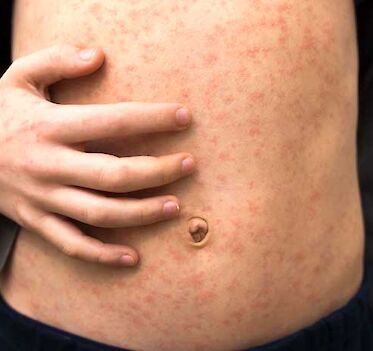How to Spot the Signs, Protect Yourself, and Respond Safely During a Measles Surge
Measles Outbreak: Symptoms, Risks, and What You Need to Know
Measles, a highly contagious viral infection, has made headlines recently due to several reported outbreaks. In a recent conversation with Dr. Spencer Reynolds, Dr. David Caltrider, and Dr. Meredith from HealthCARE Express, they emphasized the importance of knowing the symptoms, understanding how measles spreads, and preventing exposure.
What is Measles?
Measles is a viral infection that can affect multiple tissues in the body. According to Dr. Reynolds, it typically presents with symptoms that resemble pink eye, along with a cough, runny nose, swollen lymph nodes, and a distinct rash that begins on the head and spreads throughout the body. A high fever often accompanies these symptoms.
"The dangerous part about measles is that you're contagious several days before symptoms even start," says Dr. Reynolds. "In fact, you can spread it up to five days before you feel sick."
How is Measles Spread?
Measles is spread through airborne transmission. Once the virus is in the air, it can linger for up to two hours, putting anyone in that space at risk. Dr. Caltrider points out, "Ninety percent of people who are exposed to measles and are not vaccinated will end up getting it."
To prevent the spread, patients who suspect they have measles should call ahead before visiting any medical facility. "It's much safer for us to swab and test a patient in their car, rather than bringing them into the waiting room," Dr. Meredith explains. This helps protect other patients, especially those who may be immunocompromised or pregnant.
Why is Measles Serious?
While some may assume measles is just a severe cold, its complications can be life-threatening. The virus can lead to encephalitis (inflammation of the brain), which may develop years after the initial infection. "I've seen a patient with SSPE (subacute sclerosing panencephalitis), a rare complication of measles. He was hospitalized for six months and eventually passed away," shares Dr. Reynolds.
The Role of Vaccination
Vaccination remains the most effective way to protect against measles. The MMR (measles, mumps, and rubella) vaccine has been used for decades and is well-supported by research. "The MMR vaccine is safe and highly recommended because it protects against life-threatening diseases," Dr. Caltrider says. "If you're vaccinated, the chances of getting measles are significantly lower, and if you do get it, it's usually a milder form."
Educating families about the risks and benefits of vaccination is a priority for healthcare providers. Dr. Meredith emphasizes, "It’s important to have open conversations with families about the facts, especially with 90% of unvaccinated individuals at risk after exposure."
What To Do If You Suspect Measles If you or your child show symptoms of measles:
- Call ahead before visiting a clinic or urgent care center
- Avoid exposing others, especially in public spaces
- Follow medical advice for testing and isolation
Measles is not just a childhood illness; it is a serious condition that can have long-lasting health consequences. Staying informed and up to date with vaccinations is the best way to protect yourself and your community.
For more information or to schedule a vaccination, contact your local healthcare provider or visit our measles webpage for updates, guidance, and support.
Download Our Measles Infographic Here!
